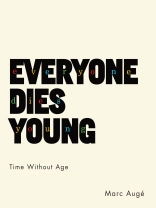’We are awash in time, savoring a few moments of it; we project ourselves into it, reinvent it, play with it; we take our time or let it slip away: it is the raw material of our imagination. Age, on the other hand, is the detailed account of the days that pass, the one-way view of the years whose total sum when set forth can stupefy us. Age wedges each of us between a date of birth that, at least in the West, we know for certain and an expiration date that, as a general rule, we would like to defer. Time is a freedom, age a constraint.’
Marc Augé remembers his beloved childhood cat, who seemed to grow wise with age, though her essential nature remained unchanged. He considers our belief that objects mature, when it is our perception of them that evolves over time. He wonders why public demonstrations of affection between the elderly make the young so uncomfortable and why we torture ourselves with regret at what might have been. Time can be liberating, he finds; it is a resource we can squander or relish. Yet age is a burden, bound by our personal and cultural neuroses. With an ethnologist’s understanding of construct and practice, Augé isolates age from the development of consciousness, desire, and representations of the self. In bold, eye-opening strokes, he casts age as a physical marker and treats one’s youthful approach to the world as the true measure of life’s value.
Spis treści
The Wisdom of the Cat
As Age Approaches
How Old Are You?
Autobiography and Ethnology of Self
Class
Images d’Épinal
Looking Your Age
The Age of Things and the Age of Others
Aging Without Age
Nostalgia
Everyone Dies Young
Notes
Index
O autorze
Marc Augé is director of studies at the École des Hautes Études en Sciences Sociales in Paris. He is also the author of Non-Places: An Introduction to Supermodernity (1995); The Future (2015); No Fixed Abode: Ethnofiction (2013); Oblivion (2004); and In the Metro (2002).Jody Gladding is a poet who has translated more than twenty works from French.












